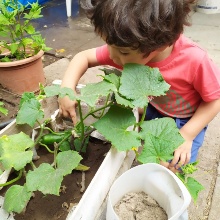The recent COVID-19 pandemic has changed the way people live in an unprecedented way. This includes severe impacts on people’s health and wellbeing such as stress, reduced physical activity and loneliness due to confinement. In parallel, people had to find ways to secure their food, with fresh food especially scarce in some regions due to lockdowns and restricted flow of goods. As in previous massive crises, the practice of home food gardening seemed to have increased during this pandemic. Yet we largely do not know which parts of society took to home food gardening, in which urban setting home food gardening was practiced, and to which extent this practice contributed to people’s daily livelihoods during the pandemic. Here, we explored the practice of home food gardening through an online questionnaire distributed in Santiago, Chile. Our results clearly show that the possibility of being in contact with nature and feeling less stress through practicing home food gardening were the most significant perceived benefits, while lack of or inadequate space to garden and limited knowledge on home food gardening were the main barriers. These findings highlight for the specific context of a metropolitan region in South America that access to gardens and green space could contribute to a just urban society.
Here's the link to the original publication: Cerda, C., S. Guenat, M. Egerer and L. K. Fischer (2022). Home Food Gardening: Benefits and Barriers During the COVID-19 Pandemic in Santiago, Chile. Frontiers in Sustainable Food Systems, 6.


